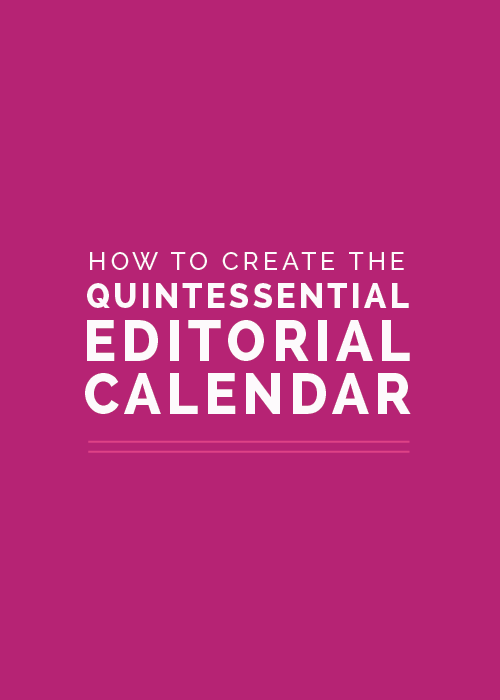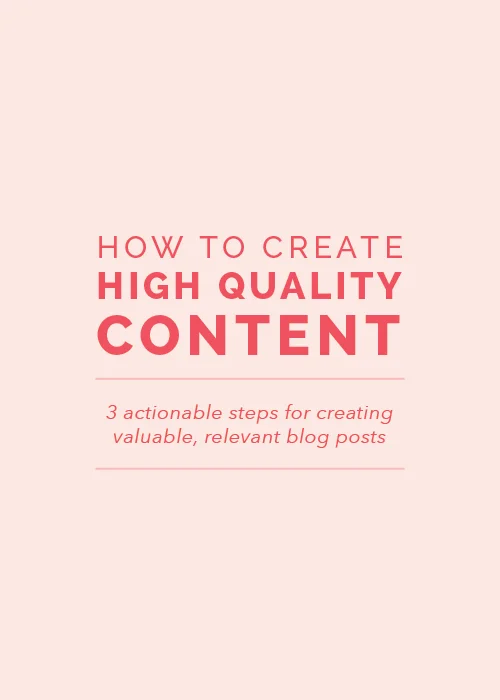Does the length of your blog posts really matter?
Well, it depends on who you ask. Bloggers, especially those in the content marketing realm, have differing views on the subject.
Some will tell you that length doesn’t matter as long as you’re providing valuable content. Others will tell you that your post has to be at least 3000+ words in length.
But if you’re asking me, I will tell you time and time again that when it comes to blog posts, length does matter.
And I have 5 reasons (and some insightful research) to prove it.
1 | Longer posts challenge you to go more in-depth
When people click on a blog graphic that advertises “8 Tips for Better Product Photography” or “How to Create a Clean and Cohesive Inspiration Board,” they have an expectation that the post they’re about to visit will cover that topic in detail.
It’s difficult to provide readers with in-depth content if your blog post is only 400 words.
Failing to meet that initial expectation of your reader can cause them not to take you seriously and worse, never visit again.
Striving for longer posts, however, pushes you to really explore a topic and not just settle for a shallow overview. It also fulfills (and possibly even exceeds) a reader’s initial expectation when they land on your post.
If visitors see that you’ve gone in-depth on a subject they’re already interested in, they’re more likely to take you seriously and click around on your site for more great content. And if they continue to find value in your posts, they’re more likely to return time and time again.
Don’t overlook the benefit of building authority and credibility through your blog. Challenge yourself to write longer posts and go more in-depth by providing stats, examples, and relevant information.
You never want to add fluff to your posts just to reach a certain word count, but it is important to make sure that you’re actually delivering on the initial promise you’ve made to your reader with your headline.
At the very least, a higher word count will push you to do more research and make your post even stronger.
2 | Longer posts also generate more engagement
Studies show that longer posts receive more interaction.
Medium wanted to find out if the length of their posts affected the amount of engagement they received, so they focused on attention rather than clicks. They charted the number of seconds their visitors spent on posts of varying lengths.
They explained their in-depth research on post engagement and post length here, but here’s the long and short of it:
They discovered that their optimal post is 7 minutes long.
The average person reads around 200 words per minute so according to their study, that’s somewhere around 1400-1600 words.
Their conclusion hit the nail on the head:
“What it does mean is that it’s worth writing however much you really need. Don’t feel constrained by presumed short attention spans. If you put in the effort, so will your audience.”
If you put in the effort, so will your audience.
Many proponents of shorter content will argue that their readers don’t have time to read long posts.
And while I agree that every audience is different, I think that response can be used as a cop-out.
I’ve found Medium’s conclusion to ring true for this blog time and time again. Putting time and effort into creating insightful, thorough posts has always paid off.
My longer, in-depth articles are usually those that have the highest number of page views, comments, and shares because there’s more content there for people to connect with and more insights for them to take away.
The very fact that you’re reading this post is proof.
3 | Longer posts give your readers more options
And even if your audience does have a short attention span, longer posts give your readers the option of scanning your post for an overview or stopping to read it in more detail.
Writing long posts doesn’t force people to read your content; they can stop reading it whenever.
But if you consistently write short posts, you aren’t even giving your readers the option to stop and dig into your content if they want to learn more.
4 | Longer posts increase your SEO
Search engines seek to match your search with the most relevant content.
Each time you enter keywords in Google’s search bar and hit Enter, Google crawls and indexes pages to see which websites are the most relevant. Search engines base that relevance on several factors like keywords, backlinks, and page views.
So it should come as no surprise that search engines love long articles.
Longer posts naturally contain more keywords.
If you’re writing a post on how you use Trello to organize your work week, you’ll organically mention Trello several times throughout the entirety of your post. The more that word appears, the more likely your post will pop up in a search engine later.
Now, is that post going to pop up first when someone types “Trello” in the Google search bar next week?
Of course not. But if you get in the habit of writing longer posts on relevant topics, you’ll increase your SEO on those topics over time.
I’ve seen this firsthand with Elle & Company.
A few years ago I started writing posts on Squarespace with the intention of raising more awareness about the platform and attracting clients who would feel comfortable using it for their website.
I never set out to rank high in Google for Squarespace. But I did set out to share long, in-depth posts to provide value to my readers.
Because keywords like “Squarespace” and “blogging” popped up often in my posts, I began to rank higher and higher in Google search results.
And without even intending to, Elle & Company now appears on the first page when people search Google for “Squarespace blog,” right underneath links from the Squarespace site itself.
I didn’t intentionally build in any keywords. I didn’t fuss with merge tags or try any shortcuts to increase my SEO on that topic.
Instead, by writing long, high-quality posts on relevant topics, my ranking improved over time.
SerpIQ wanted to find out if content length had any effect on which of their posts ranked the highest in search engines. Here’s what they found:
Their longer posts ended up ranking much higher than those that were shorter in length.
If you’re striving to write longer posts, you’ll organically add more keywords and links to your posts.
I encourage you to go take a look at the top posts on your site and see which posts get the most traffic from search engines. I’d be willing to bet they’re those that have a higher word count.
Did you know? Google Analytics allows to not only see which posts are getting the most traffic from search engines, but they let you see the keywords people are searching for when they find your site.
You can find it by pulling up your dashboard and clicking Acquisition > Search Engine Optimization > Queries in the lefthand menu.
5 | And lastly, longer posts convert better
Content marketing guru Neil Patel did an A/B test on his homepage to find out whether short form or long form content converted better. One version contained 488 words, and the other contained 1292 words.
Can you guess which page performed better and received more opt-ins?
The homepage with 1292 words.
Not only did it convert 7.6% better, but he found that the people who opted-in from the longer version were higher quality leads; they were more qualified than the shorter version.
While the test was run on his homepage and not his blog, it proves that people respond best to long content and a higher word count.
And I would argue that it’s due to all of the points I listed above: the content is more in-depth, it holds your audience’s attention for a longer period of time, and it contains more details that your audience might be searching for.
I'm not advocating adding fluff to your posts for the sake of reaching 1200+ words. Your posts need to be valuable and relevant.
But if you want to meet your reader’s expectations, provide value, increase engagement, and organically boost your SEO, I highly encourage you to lengthen your posts.
Because when it comes to blog posts, length does matter.
What are your thoughts on blog post length?



















